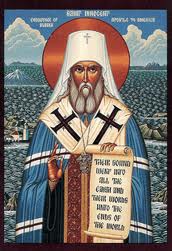|
|||
|---|---|---|---|
| This weekly bulletin insert complements the curriculum published by the Department of Christian Education of the Orthodox Church in America. This and many other Christian Education resources are available at http://dce.oca.org. | |||

We annually celebrate the anniversary of the glorification by the Russian Orthodox Church of Saint Innocent, Metropolitan of Moscow, Enlightener of the Aleuts and Apostle to America. Saint Innocent, during his Alaskan years, served the Aleut people both as priest and teacher. He was a powerful preacher and a compassionate spiritual father, and by his priestly work he brought thousands to baptism in the Orthodox Church. As a teacher, Saint Innocent always based his work on a sincere respect for the local people's way of life. He studied their traditions, customs and spoken languages. Then he created an alphabet and a grammar for the Aleut language. He translated the Gospel, many prayers, the catechism and church services into Aleut, and wrote them down so they would always be available to the people. As Orthodox Christians, the people could offer the Divine Liturgy in the languages they had always spoken. Writing about the more recent history of Alaskan education in his "Conflicting Visions in Alaskan Education" (1997, Tlingit Readers, Inc), the state's former Poet Laureate Richard L. Dauenhauer (1942-2014) contrasts Saint Innocent's attitude toward the Alaskan native people with that of Protestant missionaries who came in the late 1800's. These English-speaking missionaries were convinced that native languages should be eradicated, since they didn't "merit perpetuation." Children in the missionary schools were punished for speaking in their native tongues. Their teachers believed that the exclusive use of English was a necessary component of their effort to "elevate" their students. As Dauenhauer notes, it apparently never occurred to the missionaries to practice bilingual education, as the Russians had done. The fact that the natives had a high rate of literacy and that they already were Christian believers made no difference; they were literate in the wrong language and their Christianity (Orthodoxy) was not the right kind. Both Saint Innocent and the Protestant missionaries encountered shamans, those men who were seen as mediators between the human world and the spirit world, and who were enabled to heal sickness and solve community problems with the special knowledge they were given. Saint Innocent knew of their existence in his birthplace of Siberia. One elderly Aleut shaman, despite no previous contact with Christians, had a good knowledge of Christian teaching that astonished Saint Innocent. Writing home for advice on dealing with this person, he was told to be humble and to remember that the Holy Spirit may go to places and people that surprise us and that we do not control.
In contrast, the Protestant missionaries almost hysterically condemned shamanism as purely evil and dangerous. One missionary wrote that the shaman's incantations should be regarded as crimes. The Orthodox missionaries to Alaska based their approach to native languages and customs on the Book of Acts. That book records the stories of people from many cultures being accepted as Christians, and hearing the Word of God in their own languages. The men who followed its example remind us that respect based on love inspired the teachers in the first Christian Church, as well as those who taught in the churches of Alaska and other places. |
|||

